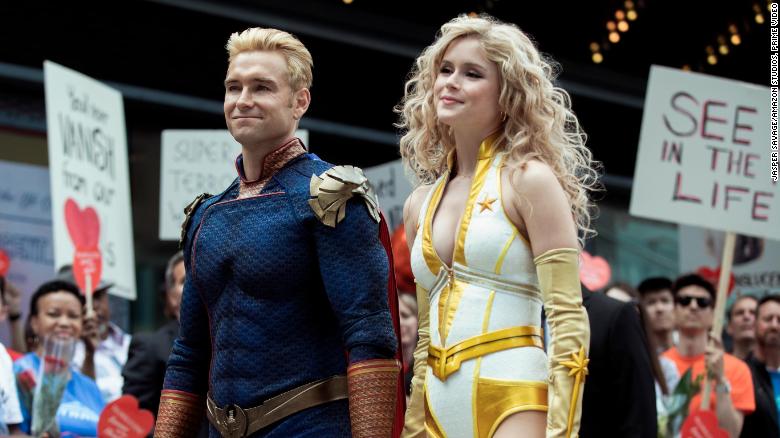Movies, News trend
‘The Boys’ dresses up one of TV’s most daring shows in a superhero costume
(CNN)“The Boys” quickly became Amazon’s signature series, and the second season of this beyond-dark show outdoes the first — offering a searing take on modern-day America that might be TV’s most subversive program, camouflaged in superhero garb.
What could be more terrifying than a psychopathic Superman? That’s a central facet of “The Boys,” which hits the ground running at extraordinary speed (appropriately), while dealing with the notion of evil hiding behind patriotic platitudes and wrapped in a cape.
For those who might have skipped season one, spoilers lie ahead if you’re thinking about catching up. Broadly, the series remains divided into warring camps, each with its own internal politics, squabbles and issues, presented with jaw-dropping levels of violence (superheroes can cause a lot of carnage when unleashed) and disarming humor.
The opening arc closed with Billy Butcher (Karl Urban), the ill-tempered leader of the ordinary mortals opposing the superheroes, learning startling news about the wife he thought he had lost.
The super-team The Seven, meanwhile, is in a state of flux, grappling with dysfunction inside its ranks and tensions regarding the corporation, Vought International, which oversees and profits from it. In season two, that includes shooting a movie starring the heroes to further buff up their carefully managed image, which cheekily references a “Joss” rewrite.
The season-one casualties allow for some terrific new players, including Vought’s unflappable boss (Giancarlo Esposito, who somehow seems to be everywhere at once) and Stormfront (Aya Cash), who fills a vacancy in The Seven and quickly shakes up the intra-squad dynamics.
The most severe threat, however, remains the mercurial Homelander (Antony Starr), the living personification of the corrupting nature of power — in this case, quite literally — who seeks to exert greater control over the team.
“Gods” should not have to feel pain, he says, adding, “Because that is what we are. … We can do anything we want, and no one can stop us. That’s a good feeling.”
As noted, “The Boys” incorporates amusing real-world and pop-culture references (someone on the writing staff seems pretty obsessed with “Hamilton”), but in a broader sense, the show is informed by a deep cynicism about how the public can be manipulated and lead down the creeping path toward fascism. While these themes arose during the first season, showrunner Eric Kripke and company have sharpened them, in a way that feels especially pointed and relevant.
The plot has also become denser over these eight episodes, including the sweet if awkward relationship between Hughie (Jack Quaid), the unlikely foe of the Seven, and Starlight (Erin Moriarty), the hero who has witnessed its corruption up close and personal.
Adapted from a popular comic, “The Boys” premiered last year amid a wave of revisionist superhero fare, including HBO’s “Watchmen” and streaming alternatives “The Umbrella Academy” and “Doom Patrol.” Clearly, expanding the lens beyond the most popular Marvel and DC fare is having its TV moment, at the risk of saturation.
Still, this series manages not only to be exciting and unpredictable but to examine the perils of hero worship in a manner that’s mind-blowing in more ways than one, and incidentally, absolutely not for the squeamish.
Amazon has already renewed the show for a third season and ordered an after-show devoted to discussing it, signs of its perceived appeal and importance to the service. While the term “hit” gets thrown around too freely in regard to streaming, with its deft mesh cultural and political satire, “The Boys” has earned its place at the head of the class.
“The Boys” second season premieres Sept. 4 on Amazon.

